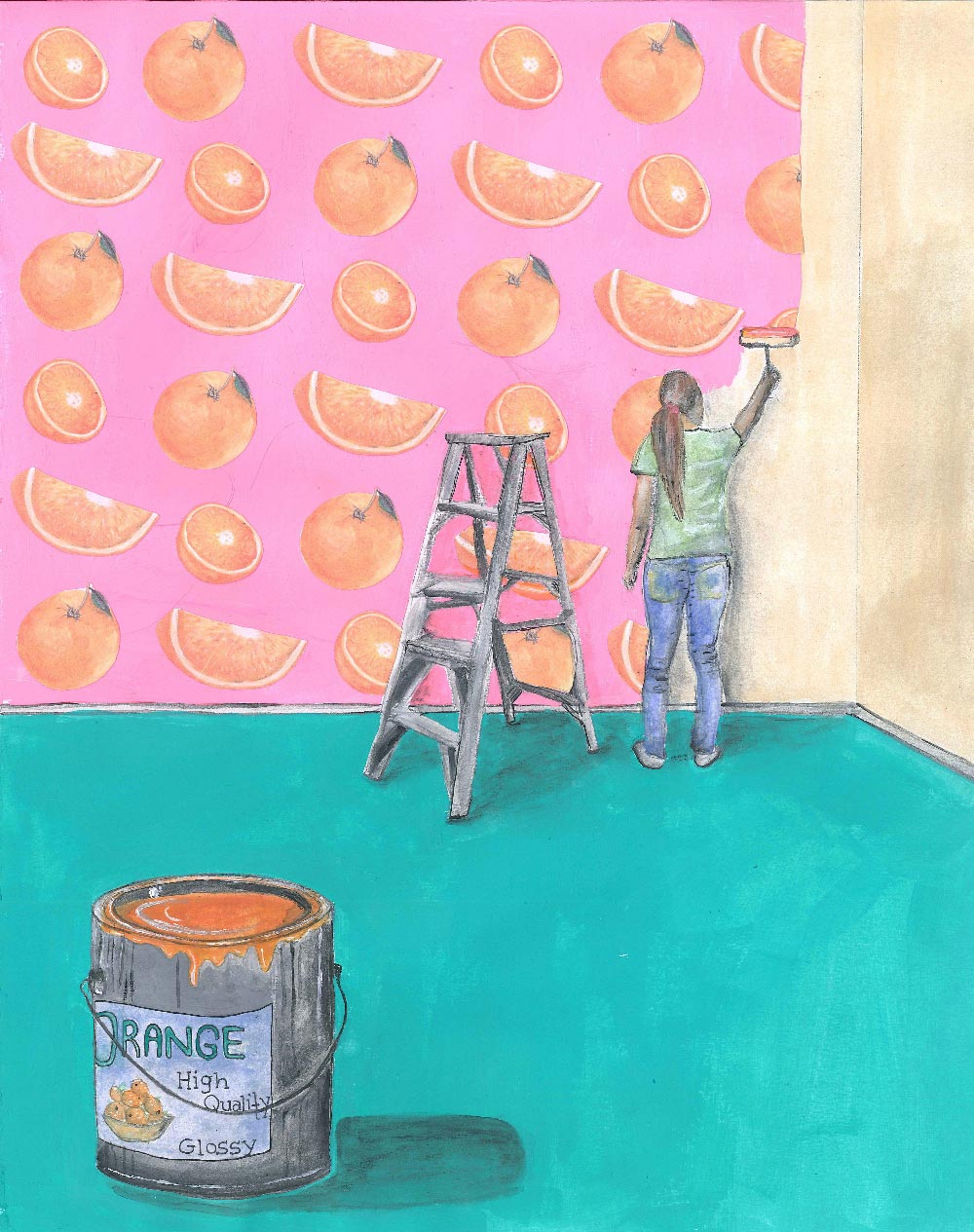spring 2019
Table of Contents
Return to Home PageIntroduction
Sixteen Weeks in the Caribbean Apartment Laura McGavin
Across This Body First Generation The Wall Jeni De La O
Six Thousand Dollars![]() Cole Depuy
Cole Depuy
orange socks![]() there are bad men at the top
there are bad men at the top![]() Kate LaDew
Kate LaDew
I Am Allowed to Break Up With You Amy Kenny
When the Time Comes![]() Soothing
Soothing![]() Cameron Morse
Cameron Morse
Terrigenous![]() Michelle Mitchell-Foust
Michelle Mitchell-Foust
Magnetic Resonance![]() Lisa Mulrooney
Lisa Mulrooney
Sophocles![]() Martin Kippenberger's Bicycle
Martin Kippenberger's Bicycle![]() Charles Kell
Charles Kell
Catastrophe that Nearly Brought Down a Plane![]() Sabyasachi Nag
Sabyasachi Nag
Tensions![]() Orange Bottles
Orange Bottles![]() Sean Singer
Sean Singer
Against All Odds![]() Mary Lou Soutar-Hynes
Mary Lou Soutar-Hynes
Introduction
Happy Spring to you, dear reader, and welcome to the latest issue of The Maynard.
Join us and the 24 poets featured in Vol. 12, No. 1 of what some have called “one of the juiciest poetry journals online... or anywhere.” Sip our freshly squeezed issue; have a read, a listen, and discover for yourself the poems we’ve selected to share with you.
Close to 200 poets sent us their work during the last submission period, which closed 31 January. FYI: That’s one of two cut-off dates by which you can send us your work for consideration; the next is July 31. That means we’re open to receiving your risk-taking, weirdest work for the Fall issue now; send it to us! Back to the workings of the editorial process for this issue. In this bushel (we’re always thinking of oranges…) of poems, we were struck generally by the urgent cries, focusing on social and environmental injustices. Different politics inevitably fed into the reading and selection process, and TM is proud to advocate for a range of courageous and defiant voices. Joining the poems, a dozen images sent from artists who offered their work for the issue’s cover. Seeing the variety of artistic interpretations of oranges absolutely delights us! To paraphrase Ukrainian-born French artist, designer, and collaborator with poets, Sonia Delaunay, poetry and painting are most alike, the most simultaneous of mediums. Many thanks to each of the poets and artists during the spring editorial process who trusted us with their work.
To arrive at our magical number of 24 voices for the issue, the five editors had (read: needed) a system: we all read and revisited each poem received (Yes, that means each poem received five reads; a fact of which we’re proud!), then came up with a personal “wish list” of 22 to 24 poets. From these lists, we arrived at a short(er) one, made up of those poems receiving two or more nods from editors with a few extras added—voices championed unyieldingly by unshaken editorial minds—adding flavour to the process. It got orange-juice sticky! After laughter, reconsiderations, and a few “Aha!” moments, we arrived at 31 poems by 24 poets.
As in the past, for this issue we’ve made the most of TM’s online format and published 21 audio recordings along with texts. Jeni De La O’s “The Wall” becomes dynamic in our format. Take a look, check out the shifting layout. There are also magnetic conversations between poems, as with Carmen Pintea’s “Taxi” and Sean Singer’s taxi-driving poems. Then there’s bonny c.d.’s “Ratterrattan,” a turbulent exercise in vocabulary and sound play. Read it, listen to the poet’s reading, go back and read the text aloud… and if your ears (and mind) aren’t ringing by then, check out Emily Osborne’s “Tinnitus.” Another kind of turbulence awaits in Sabyasachi Nag’s “Catastrophe that Nearly Brought Down a Plane.”
Cole Depuy’s “Six Thousand Dollars” captures the tragedy of drug addiction, gun violence, and the distanced connectedness of text messaging, while Kate LaDew’s topical work gives voice to victims and breaks the silence around sexual violence. Another type of violence haunts Jes Battis’ “Physio,” a reflective, honest piece that plays with time’s tricks, similar in that way to Maryka Gillis’ “After Dreams,” an unrequited dialogue of mourning. In David Ly’s “Descension,” desire does what it does best and confuses the self with the other, the concrete with the abstract. There are many more striking reads to be discovered in the issue. Some slide subtly off the page, while others jump quickly in your face.
Lauren Prousky’s “wallpaper oranges,” featured on the cover, introduce the issue’s poems. We chose Lauren’s piece for its re-decorative spirit, which we think reflects the expressive potential in contemporary poetry, where new voices are coming to the fore with their necessary communiques, helping us to see, hear, and think about the world and each other in more expansive ways.
We wish you happy reading and listening. May what you read and hear repaint your minds and ears,
Nick Hauck, Jami Macarty, Ram Randhawa,
Calliope Babalis & Leena Niemela
Editorial Team, Spring 2019 issue
The Maynard

